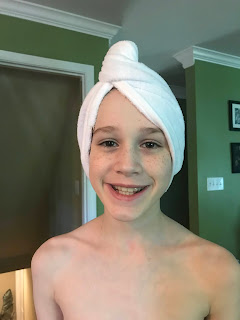I love to teach Macbeth to high school students because it is just packed full of so much humanity, and even though it is hundreds of years old, it is written in such a way that it is eternally relevant.
The other night a friend and I went to see a parking lot performance of the play (which was just brilliant for making theater happen safely for audiences during a pandemic). Even though I have read the play numerous times and seen the play performed numerous times, I was struck by how much the play relates to something I've seen being discussed lately in modern politics:
What makes a man?
There seems to be a juxtaposition between Donald Trump as a "manly man" and Joe Biden as not because of showing affection to his son. I realize social media is not real life, but there seems to be this idea of a man as either
1--physically strong, macho, won't back down, won't take no for an answer, grab 'em by the pussy
OR
2--affectionate with kids and dogs and therefore able to be taken advantage of. Rather than grabbing others by the pussy, this version of a man is that he is the pussy.
A writer/professor I follow on Twitter recently wrote an article about this exact topic.
I'm just going to acknowledge that it is stupid to have these polarities because manliness can be a lot of different things just as being a woman can be many things. A woman doesn't have to be maternal, just as a man doesn't have to be a clone of John Wayne. The context of the moment, though, is that there are two different men running for president who have drastically different "what a man is" personas.
This is a central focus in Macbeth. Lady Macbeth gives her husband hell about having the balls to kill the king. "Be a man!" she more or less says to him. And so Macbeth becomes that "manly man" who ravages those around him, although after his first murder he does his killing mercilessly from a distance--he hires his murders out to others. He becomes paranoid and chaotic.
On the other side, we have Macduff, whose wife and children Macbeth has someone else murder. When Macduff is told to "Dispute [their deaths] like a man," his reply shows the other option of what it means to be a man:
"I shall do so; But I must also feel it as a man, I cannot but remember such things were that were most precious to me."
The entire play is a drama about the choices men make----to put ambition before everything else; to listen to others (in this case a lady) who insult them and badger them into "acting as a man" even when they know it is the wrong thing to do; to continue on the evil rampage because they've already gone too far and it's not worth it to turn back.
It is always intellectually stimulating (those emotionally exhausting) when modern politics and Shakespeare's writing converge.




